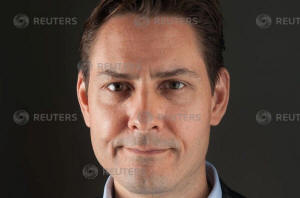|
Crisis Group says no word from China on
detained Canadian employee
 Send a link to a friend
Send a link to a friend
 [December 12, 2018]
By John Ruwitch [December 12, 2018]
By John Ruwitch
SHANGHAI (Reuters) - The International
Crisis Group (ICG) on Wednesday said it had received no information from
Chinese officials about the detention of its employee, former Canadian
diplomat Michael Kovrig, and that it was seeking consular access to him.
The ICG, a think-tank focused on conflict resolution, said in a
statement to Reuters Kovrig was detained by state security officials in
Beijing on Monday night.
His detention, first reported by Reuters, came after police in Canada
arrested the chief financial officer of China's Huawei Technologies Co
Ltd [HWT.UL] on Dec. 1 at the request of U.S. authorities, which
infuriated Beijing.
The Canadian government said it saw no explicit link to the Huawei case.
Diplomats in China said the apparent involvement of the secretive state
security ministry, which engages in domestic counter-espionage work,
among other things, suggests the government could be looking at leveling
spying accusations.
However, ICG President and Chief Executive Robert Malley said the group
did not engage in such activity.

"I don't want to speculate as to what's behind it but I am prepared to
be categorical about what's not behind it, and what's not behind it is
any illegal activity or endangering of Chinese national security,"
Malley told Reuters.
"Everything we do is transparent, it's on our website. We don't engage
in secretive work, in confidential work."
Chinese foreign ministry spokesman Lu Kang said he had nothing he could
say on the details of the case. He added the ICG was not registered in
China as a non-government organization (NGO) and Kovrig could have
broken Chinese law.
"If they are not registered and their workers are in China undertaking
activities, then that's already outside of, and breaking, the law,
revised just last year, on the management of overseas non-governmental
organizations operating in China," Lu told reporters.
The ICG must make clear the relevant situation, he said.
"With regards to the group, I must make it clear, that they are not
legally registered in China, so if they engaged in that kind of
activities, then that's outside Chinese law."
The Ministry of Public Security, which has oversight over foreign NGOs,
did not respond to a request for comment. China's Ministry of State
Security has no publicly available contact details.
The foreign NGO law, which took effect in January, is part of a raft of
new national security measures introduced under President Xi Jinping.
"All foreigners that come to China, so long as they respect the law,
have nothing to worry about," Lu added.

[to top of second column]
|

Michael Kovrig, an employee with the International Crisis Group and
former Canadian diplomat appears in this photo provided by the
International Crisis Group in Brussels, Belgium, December 11, 2018.
Courtesy CRISISGROUP/Julie David de Lossy/Handout via REUTERS

'NO COINCIDENCES'
William Nee, China Researcher for Amnesty International's East Asia
Regional Office in Hong Kong, said Kovrig's detention was alarming,
especially as it appeared to be the first time the law has been used
to detain a foreign NGO worker.
"We need to wait for the official explanation from the Chinese side,
but this detention could have a chilling effect on the foreign NGO
and business communities in terms of their feeling safe while
traveling in China," he told Reuters.
"This comes in the context in which the procedural safeguards in
cases deemed to be political by the Chinese authorities are
routinely ignored."
Guy Saint-Jacques, Canada's former ambassador to China, was asked by
the Canadian Broadcasting Corp on Tuesday whether the Kovrig
detention was a coincidence after the arrest of Huawei executive
Meng Wanzhou.
"In China there are no coincidences ... If they want to send you a
message, they will send you a message," he said.
A Western diplomat in China, who asked not to be identified, was
even more blunt: "This is a political kidnapping."
China had threatened severe consequences unless Canada released Meng
immediately and analysts have said retaliation for the arrest was
likely.

Meng was granted bail by a Canadian court late on Tuesday, 10 days
after her arrest in Vancouver on U.S. claims that she misled
multinational banks about Iran-linked transactions sparked a
diplomatic dispute.
Malley said Kovrig, who was based in Hong Kong, had been working on
issues related to Chinese foreign policy in Asia and Africa.
"I'm just going to hope that whatever process is under way is going
to be a fair one and one that will quickly show that there's nothing
against him," he said.
The U.S. State Department was considering issuing a travel warning
for its citizens, two sources said on Tuesday.
The Canadian government was considering issuing a similar warning,
Canada's CTV network said. Reuters was not able to confirm the
report.
(Additional reporting by Christian Shepherd, Michael Martina and Ben
Blanchard in BEIJING; Writing by Tony Munroe; Editing by Paul Tait,
Robert Birsel)
[© 2018 Thomson Reuters. All rights
reserved.]
Copyright 2018 Reuters. All rights reserved. This material may not be published,
broadcast, rewritten or redistributed.
Thompson Reuters is solely responsible for this content. |